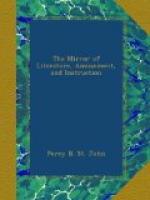“I leave,” said the testator (who I have before said was a bit of a satirist,) “my share of the bank, and the whole or my fortune, legacies excepted, to”—(here Mr. Ferdinand Fitzroy wiped his beautiful eyes with a cambric handkerchief, exquisitely brode) “my natural son, John Spriggs, an industrious, pains-taking youth, who will do credit to the bank. I did once intend to have made my nephew Ferdinand my heir; but so curling a head can have no talent for accounts. I want my successor to be a man of business, not beauty; and Mr. Ferdinand Fitzroy is a great deal too handsome for a banker; his good looks will, no doubt, win him any heiress in town. Meanwhile, I leave him, to buy a dressing-case, a thousand pounds.”
“A thousand devils!” said Mr. Ferdinand Fitzroy, banging out of the room. He flew to his mistress. She was not at home. “Lies,” says the Italian proverb, “have short legs;” but truths, if they are unpleasant, have terrible long ones! The next day Mr. Ferdinand Fitzroy received a most obliging note of dismissal.
“I wish you every happiness,” said Miss Helen Convolvulus, in conclusion—“but my friends are right; you are much too handsome for a husband!”
And the week after, Miss Helen Convolvulus became Lady Rufus Pumilion.
“Alas! sir,” said the bailiff, as a day or two after the dissolution of parliament, he was jogging along with Mr. Ferdinand Fitzroy, in a hackney coach bound to the King’s Bench,—“Alas! sir, what a pity it is to take so handsome a gentleman to prison!”
The MS. found in a Madhouse, by the same author, is perhaps too horrific for this terror-loving age; but it is by no means less clever on that account; toute en huile would not do. Among the other tales are the Rock of the Candle, Irish, by the author of Holland-Tide,—nearly forty pages; and the Queen of May and Bridget Plantagenet,—of the olden time—which would be spoiled by abridgment for our present purpose. The same reason prevents our giving more than our commendation of Miss Mitford’s General and his Lady, who, we think are new company for our fair authoress.
In the Vision of Purgatory, by Dr. Maginn, (Irish, of course,) the serious and ludicrous are mixed up with an abundance of skill and humour; this piece should be read after the Madhouse sketch.
The Souvenir is opportunely dedicated to Mr. Peel; and whether as a work of art, or elegant literature, it is decidedly worthy of such distinguished notice. If the argument of the fine arts contributing to virtue hold good, then the patronage of a minister will be patriotically bestowed on such works as the Literary Souvenir.
* * * * *
The Amulet.
Edited by S. C. Hall, Esq.
It would be difficult and somewhat egotistical for us to describe the pleasure we felt on our receiving this interesting volume for notice in our pages. The amiable spirit which breathes throughout its pages, and the good taste which uniformly dictates its editorship have secured the Amulet an extensive, and we are disposed to think, a more permanent, popularity than is attached to other works of similar form.[1]




